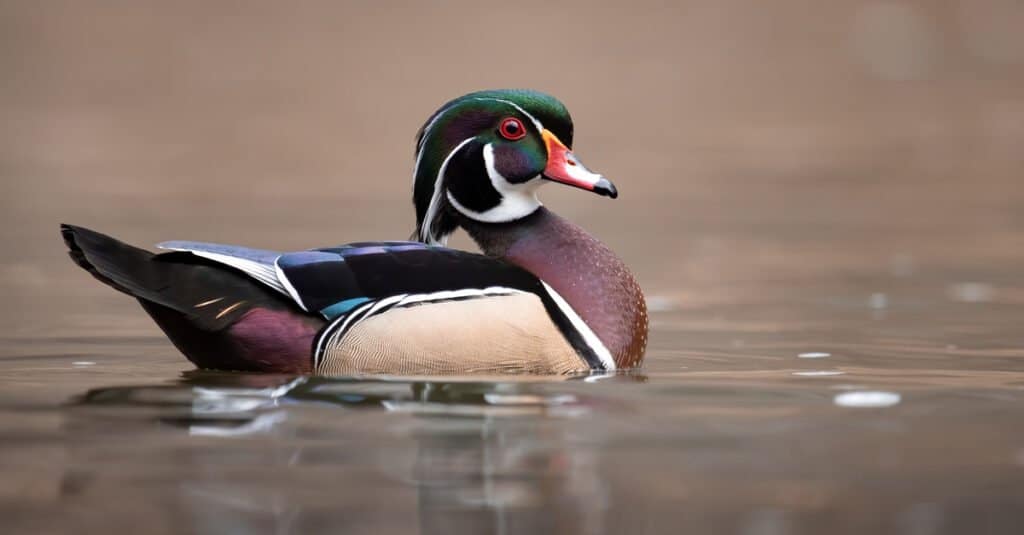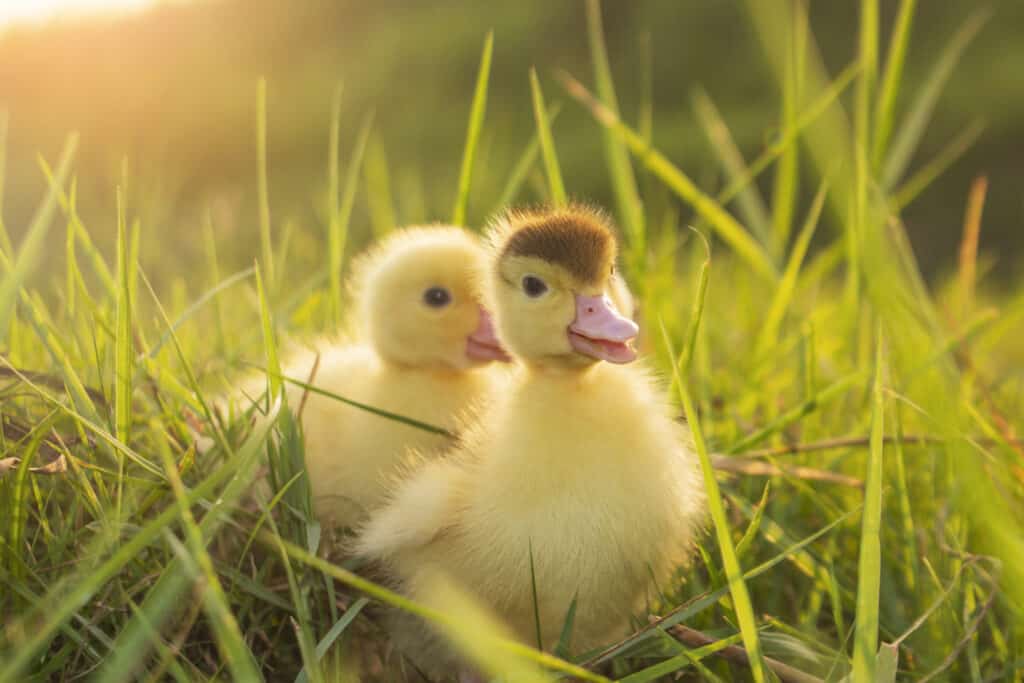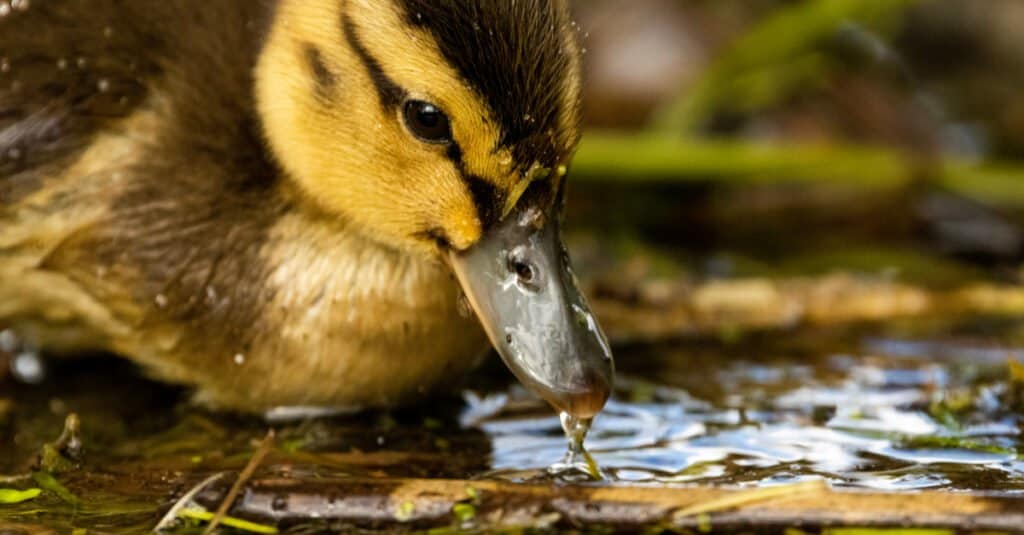Some animals hibernate during the winter, while others migrate to warmer areas. However, not all birds leave home. So, what about ducks? What do ducks do in the winter? Where do they go? As the temperature drops, you may notice that ducks begin to move in large groups. We have all seen ducks fly in the iconic ‘V’ formation, especially as the temperature decreases.
Do Ducks Migrate in the Winter?

Like tourists, many ducks travel to Florida during the winter before returning to their ‘summer’ home and nesting ground.
©Harry Collins Photography/Shutterstock.com
Ducks fly south in the winter, looking for warmer and milder conditions. Ducks are hardy creatures, meaning they are resistant to the cold. This does not mean they like living in cold areas. Instead of staying and dealing with the snow, most ducks migrate in the winter. Popular migratory spots in the United States include Florida and Georgia. Like tourists, many ducks travel to Florida during the winter before returning to their ‘summer’ home and nesting ground.
You are likely to spot the following ducks in some warm and mild southern parts of the U.S during winter:
- Northern Pintail Ducks
- Northern Shoveler Ducks
- Blue-Winged Teal Ducks
- Ring-Necked Ducks
- Red-Breasted Merganser Ducks
Some domestic ducks brave the winter with warm homes and resources. Pet ducks and ducks on farms during cold winters will stay in place if they have a regular supply of food, water, and a moist area to lay. Typically, ducks migrate when lakes in their area freeze.
Do Ducks Come Back to the Same Place Every Year?
There is a common belief that all ducks instinctively fly back to the same place every year, both before and after winter, but is this true? Yes, for the most part, it is true. While ducks don’t have to return to the same place every year, they have a strong breeding ground affinity. Often, ducks will return to their home after winter is done since they have a strong bond with their breeding flock. The flock typically moves to the same warmer locations. Ducks follow navigational cues to make it home.
How Do Ducks Survive Winter?

Some species of ducks live in Florida and Georgia all-year round.
©iStock.com/Agus Prianto
The ducks that leave the cold and frozen areas survive by looking for warm land with lakes and food. They fly up to 800 miles looking for a warm home. The ducks that stay find shelter and continue to look for lakes and ponds that are not frozen. Keep in mind that not all winter seasons look the same. For example, some species of ducks live in Florida and Georgia all-year round and do not need to travel further during the “cold” months, as the temperature only slightly drops.
However, ducks that stay in the cold have their form of protection. Despite their migratory habits, ducks are hardy and built for the cold. For instance, their fat is naturally dense and water-resistant. This keeps them warm by insulating them. Fun fact, some species of ducks live in the arctic and are used to freezing temperatures. These include the Long-tailed duck and the Spectacled common eider duck.
How Cold Is Too Cold for Ducks?
Ducks cannot withstand cold temperatures for long periods. Like most animals, ducks can suffer from frostbite when the temperature is well below freezing. Their feet need to stay warm. Wild ducks cannot thrive in areas that dive below 20 degrees Fahrenheit. This may be why ducks fly to warmer areas when the lakes freeze. Interestingly, one study found that ducks are changing how they react to the presence of ice in their lakes due to global warming.
What Do Wild Ducks Eat in the Winter?
Wild ducks have a limited supply of food during winter, which is likely why they fly far away from the icy cold weather. Ducks typically consume small insects, seeds, pondweed, and water snails. But what happens when their lakes freeze over? Wild ducks during the winter consume whatever they can find. It is common to watch groups of wild ducks plow through trash cans and bags, looking for food, especially leafy greens. While you can’t feed ducks bread, you can offer them lettuce, rice, and oats if you spot a straggling duck during the winter.
What Do Domestic Ducks Eat in the Winter?

During the winter, ducks need to store warmth to survive the cold temperatures.
©Matias Gauthier/Shutterstock.com
Domestic ducks are a lot luckier than wild ducks. They are not limited to what nature can offer and will eat whatever their owner gives them. During the winter, ducks need to store warmth to survive the cold temperatures, which means they need much more food. You can feed domestic ducks common foods like:
- fresh tomatoes
- cooked rice
- uncooked rice
- grains
- corn
- cabbage
- kale
- peas
- zucchini
- leafy greens
- tadpoles
- bananas
- vegetable peels
- small fish
Protecting domestic ducks in the winter is more than just feeding them well. Make sure to keep their feet dry, as they can freeze on hard surfaces, especially if they are metal. Replace the hay and keep their general area warm with additional dry blankets. A good place to do this is within a duck cubby or hiding hole.
Up Next:
What Do Ducklings Eat? 13 Foods for Baby Ducks
The photo featured at the top of this post is © iStock.com/Anna39
Sources
- National Library of Medicine, Available here: https://www.ncbi.nlm.nih.gov/pmc/articles/PMC5541925/
Thank you for reading! Have some feedback for us? Contact the AZ Animals editorial team.






